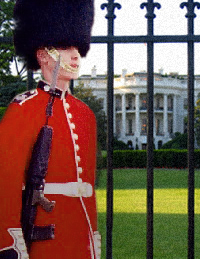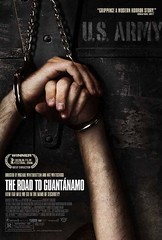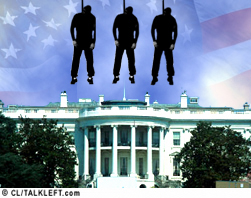Home / Terror Detainees


Update: Sen. Frist has announded the Senate will not take up the issue of legal rights of the detainees until after the August recess.
*******
It seems like the Supreme Court's decision in Hamdan (opinion here, pdf) has thrown the legislative and executive branches into a tailspin. They can't figure out what to do with it. Nonetheless, the Senate is set to begin debate on how to try detainees and the debate could take the rest of the summer.
In its decision, the Supreme Court said, on a 5-to-3 vote, that the planned commissions were unauthorized by federal statute and violated international law.
In opposite corners:
On one side of the debate are Republicans who believe Congress should give the president the authority to set up the kind of military commissions that were struck down by the court. Such commissions would sharply curtail defendants' rights.
On the other side are those who say the trials should be modeled on the military system of courts-martial, an approach that would give detainees more due-process rights than would the commissions. In between, many Republicans and Democrats alike argue for starting with the military judicial system and tweaking it to reflect the differences of trying terrorism suspects.
(11 comments, 496 words in story) There's More :: Permalink :: Comments
Cyrus Kar was born in Iran but has lived in the U.S. since he was two years old. A naturalized citizen, he played high-school football in Utah and Washington and then joined the Navy. His dream was to make a movie about an ancient Persian King who championed tolerance and human rights.
When he reached the point of site selection for his film, he was 44 and traveled to Baghdad to research archeological sites. You could probably recite the rest of the story. He got arrested, supposedly because "suspected bomb parts" were in the taxi in which he was riding. He was held for two months in a Baghad jail without charges, then released.
Kar's family and lawyers describe as the frightening netherworld of American military detention in Iraq - charged with no crime but nonetheless unable to gain his freedom or even tell his family where he is being held.
The FBI searched his apartment and not surprisingly, found nothing.
(50 comments, 1031 words in story) There's More :: Permalink :: Comments
Murray Waas is blogging about Guantanamo, Colin Powell, McCaffrey, and Ignatius.
The New York Times reports Bush claims the Supreme Court backed him on Guantanamo.
"It didn't say we couldn't have done -- couldn't have made that decision, see?" Mr. Bush said at a news conference in Chicago. "They were silent on whether or not Guantánamo -- whether or not we should have used Guantánamo. In other words, they accepted the use of Guantánamo, the decision I made."
Nice try, Mr. President, but Guantanamo wasn't the issue in the case -- the use of military tribunals was, and there was no approval of them.
(21 comments) Permalink :: Comments

Time Magazine has a long feature article, How to Fix Guantanamo.
It offers five suggestions, all well-taken:
- 1. The White House must work with Congress
- 2. Repatriate the small fish
- 3. Process the 400 plus habeas cases through the courts. In other words, let the judiciary do its job
- 4. Live by the Geneva rules
- 5. Lift the veil of secrecy
The article also notes that 75% of those being held are no longer being interrogated. If they haven't been charged with a crime and have no useful intelligence information, it's time to send them home -- or to another country that is willing to take them and allow them to live in freedom.
(18 comments) Permalink :: Comments


Alberto Gonzales, speaking from Egypt today, says the Supreme Court's Hamdan decision "hampers our ability to deal with terrorists." Shorter version: We're not going to stop holding people indefinitely, without charges and without access to lawyers.
Gonzales emphasized that the court ruling didn't say "that we could not continue to hold enemy combatants indefinitely for the duration of hostilities, which was something the Supreme Court said we could do..." The prison was established in early 2002.
"That path is still available to us. The president of the United States can continue to hold enemy combatants at Guantanamo. But we are looking at ways to provide as many tools as possible to the president of the United States in dealing with terrorists," he added.
Shorter version II: We will use all our political capital to get Congress to approve what the Supreme Court threw out.
Yale law professor Jack Balkin at Balkanization discusses this strategy.
(38 comments, 236 words in story) There's More :: Permalink :: Comments


The only Senator to speak about the Supreme Court's decision in Hamdan v. Rumsfeld today was Dick Durbin (D-IL.) Here is his statement and a snippet:
Today, the Supreme Court ruled against the Bush administration and for James Madison and for the rule of law. Here is what Justice Anthony Kennedy said: "Concentration of power (in the executive branch) puts personal liberty in peril of arbitrary action by officials, an incursion the Constitution's three-part system is designed to avoid."
This is a historic decision -- a decision that reminds this President and every President to come that they must answer first to the Constitution of the United States. It says to President Bush and all of those who promulgated these policies that they must answer to our Constitution.
Let's hope our Imperial President takes note.
(21 comments, 476 words in story) There's More :: Permalink :: Comments
As the Administration puts out more spin on detainee suicides, the reality is that these suicides are acts of despair, not acts of war.
Many of these men, uncharged of any crime, have reported that they've been told that they will never get out. Aziz does not know if he will survive what he calls this "compulsory, slow execution."
Still, many detainees also believe that there is some moral impulse that will push the American people to action. They thought that starving themselves will make people pay attention. They thought that telling the humiliating and painful stories of torture or abuse will outrage us. Perhaps now they think that their dying will make us finally acknowledge what our country is doing. Instead, we allow ourselves to be told that these deaths were an act of war and not even give it a second thought.
In the mail today: Guantanamo and the Abuse of Presidential Power by Joseph Margulies, lead counsel in Rasul v. Bush in which the Supreme Court ruled that Guantanamo detainees are entitled to judicial review.
(74 comments) Permalink :: Comments

14 Saudi detainees at Guantanamo have been returned to Saudi Arabia. Of them, one was declared by the U.S. not to be an enemy combatent.
The releases bring to 310 the number of detainees who have departed Guantanamo to other governments, including Albania, Afghanistan, Australia, Bahrain, Belgium, Denmark, France, Great Britain, Kuwait, Morocco, Pakistan, Russia, Saudi Arabia, Spain, Sweden and Uganda.
About 450 detainees remain at Guantanamo, including 120 who are considered eligible for transfer or release. Decisions in those cases depend on discussions between the United States and other nations.
The Road to Guantanamo is showing in several cities now. It really is an important film to see. Details are here.
(4 comments) Permalink :: Comments

I just finished watching "The Road to Guantanamo." It is as good as the reviews say. It opens June 23 in theaters in some cities and you should definitely see it. It's part documentary and part drama. It's very fast-paced and the scenes in Afghanistan and Guantanamo are very real -- and frightening. It also will make you very angry -- and drive home the realization that not all the detainees at Guantanamo can be the "worst of the worst" because many don't belong there at all. And yes, they were mistreated.
The four subjects of the film, Asif Iqbal, Ruhel Ahmed, Shafiq Rasul (pdf), and Monir Ali were British teens of Pakistani descent who went to Pakistan because one was getting married in an arranged marriage. Almost on a whim, they naviely decided to go to Afghanistan. The U.S. started its bombing campaign right afterwards. They get captured by the Northern Alliance and three of them get turned over to the Americans who won't believe they aren't al-Qaeda and send them to Guantanamo where they are held for two years without charges before being returned to England and finally freed. They appear in the film as narrators while actors re-create their ordeal. The fourth, Monir Ali, got separated and has not been heard from again, although he may be in a Pakistani prison.
(54 comments, 608 words in story) There's More :: Permalink :: Comments

The ACLU today released 1,000 Pentagon documents on Guantanamo, including some pertaining to suicide attempts.
"These documents are the latest evidence of the desperate and immoral conditions that exist at Guantánamo Bay," said Anthony D. Romero, Executive Director of the ACLU. "The injustices at Guantánamo need to be remedied before other lives are lost. We must uphold our American values and end indefinite detentions and widespread abuse."
...."It is astounding that the government continues to paint the suicides as acts of warfare instead of taking responsibility for having driven individuals in its custody to such acts of desperation," said Amrit Singh of the ACLU Immigrants' Rights Project. "The government may wish to hide Guantánamo Bay behind a shroud of secrecy, but its own documents reveal the hopelessness and despair faced by the detainees who are being held without charge and with no end in sight."
The documents are available here.
(22 comments) Permalink :: Comments
Air Torture, flying to select torture chambers around the world.
No fares, no paperwork.
Check out the new Amnesty International campaign. Contact your congresspersons and tell them to ground Air Torture for good.
This is one of the coolest ad campaigns ever. You can add the button to your blog and even print your own boarding pass (pdf).
Read the case studies:
(10 comments, 156 words in story) There's More :: Permalink :: Comments

Observer reporter David Rose was en route to Guantanamo when the suicides occurred and the Pentagon cancelled his pass. He has a very powerful article on what happened and what might have happened.
Here are some snippets from Rose's report:
(27 comments, 1247 words in story) There's More :: Permalink :: Comments
| << Previous 12 | Next 12 >> |








